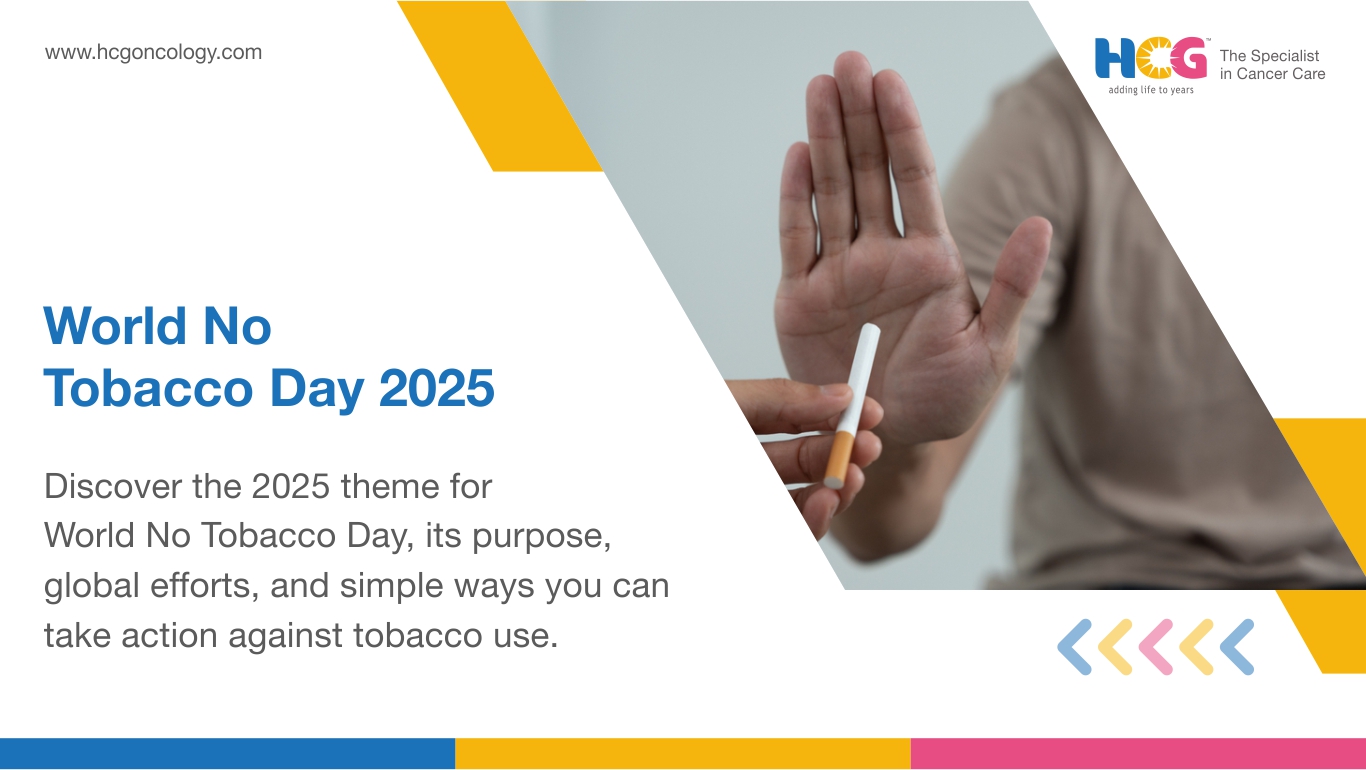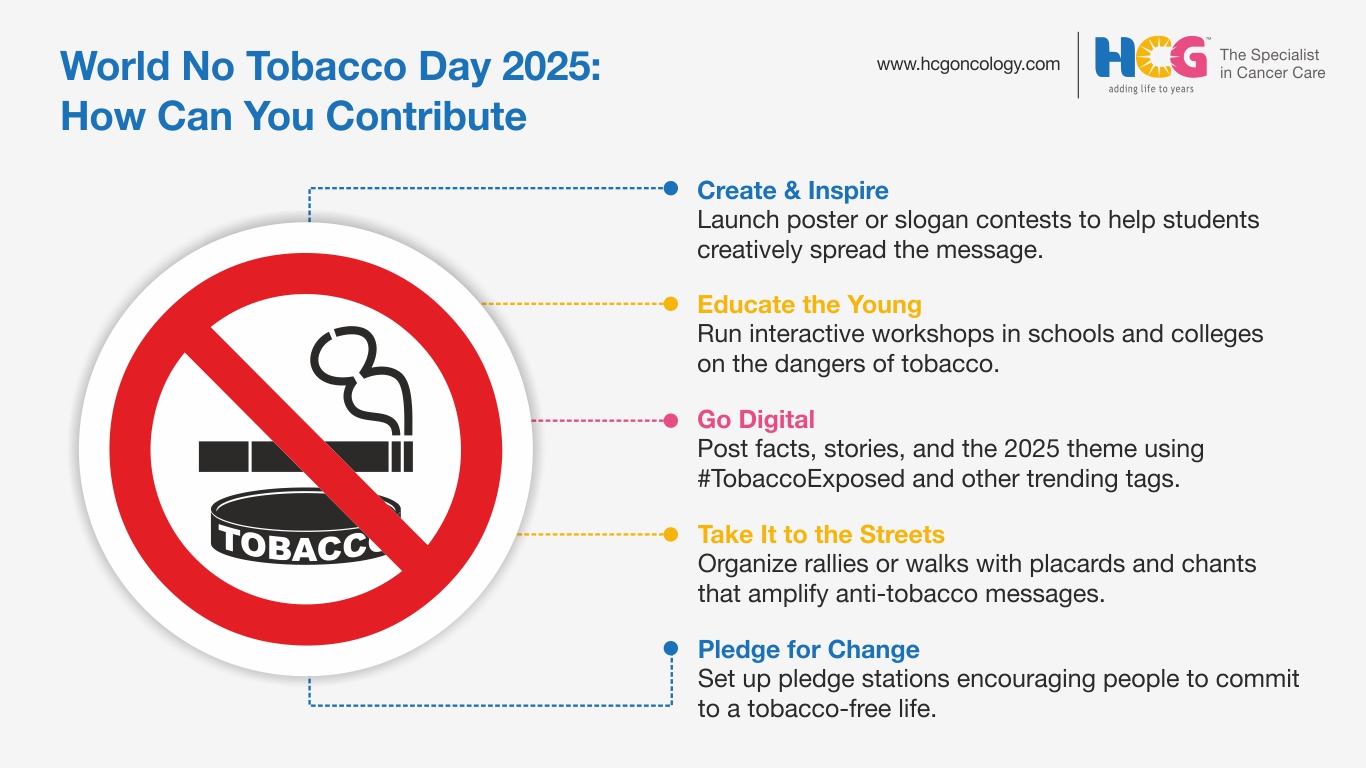
01 Nov, 2025
Feel free to reach out to us.

01 Nov, 2025

This article is medically reviewed by Dr. Yash Mathur, Consultant – Head & Neck Oncosurgery and Robotic Surgery, HCG Cancer Centre, Borivali.
World No Tobacco Day is a significant annual event by the World Health Organization (WHO). The purpose is to raise awareness about the consequences of tobacco use and encourage people to quit smoking.
Occasionally, World No Tobacco Day is referred to as National No Smoking Day or Anti-Tobacco Day.
World No Tobacco Day is an opportunity to raise awareness about the dangers of tobacco use and to urge government bodies to take action to protect society from the harmful effects of tobacco.
Watch this video from one of HCG’s specialists to understand the benefits of quitting tobacco:
World No Tobacco Day is celebrated on May 31st every year.
If we are to learn about the World No Tobacco Day history, it all began in the year 1987.
The member states of the World Health Organization began observing World No Tobacco Day in 1987 as a response to the global tobacco crisis and the diseases and deaths caused by the epidemic.
The World Health Assembly passed Resolution WHA40.38 in 1987, calling for April 7 to be “World No-Smoking Day.” The next year, Resolution WHA42.19 was passed, issuing May 31 as an annual observance of World No Tobacco Day.
Since then, new World No Tobacco campaigns are initiated every year across the world, aiming to spread awareness about the dangers of tobacco and its negative impact on health, as well as the exploitation of the nicotine industry that is geared towards the youth in particular.
It also aims to reduce the incidence of various tobacco-related illnesses, including different types of cancer, and deaths, and educate people about the importance of World No Tobacco Day.
The official World No Tobacco Day 2025 theme is “Bright Products. Dark Intentions. Unmasking the Appeal.”
This year’s World No Tobacco Day theme exposes the manipulative tactics used by the tobacco industry to make its products seem attractive, especially to youth and vulnerable populations.
From colorful packaging and sleek designs to flavored variants and digital marketing, tobacco products are deliberately crafted to appear “bright” and appealing, masking the deadly consequences behind them.
The past themes for World No Tobacco Day reflect the World Health Organization’s evolving focus on global health challenges linked to tobacco.
In 2023, the theme was “Grow food, not tobacco,” highlighting the harmful impact of tobacco farming on food security, health, and the environment. The campaign encouraged governments to support farmers in transitioning from tobacco to sustainable food crops and to end subsidies that fuel the tobacco industry.
In 2024, the theme shifted to “Protecting children from tobacco industry interference” with the slogan “Youth step in and speak out—#TobaccoExposed.” This campaign aimed to amplify youth voices and raise awareness about how the tobacco industry targets young people through marketing and addictive products like e-cigarettes.
With an estimated 37 million youth aged 13–15 using tobacco globally, the campaign called for stronger protections against industry influence to prevent a new generation from falling into addiction.
The objective of World No Tobacco Day 2025 is to make this day and every day a tobacco-free day and to expose and raise awareness about the tactics employed by the tobacco and nicotine industries to make their harmful products appealing, particularly to young people.
The campaign aims to unmask the industry's strategies, such as the use of flavors, additives, and deceptive designs, that mask the harsh consequences of consuming tobacco and nicotine products, thereby increasing their attractiveness and potential for addiction among youth.
By shedding light on these manipulative practices, WHO seeks to advocate for stronger policies, including bans on flavored products, comprehensive advertising restrictions, and regulations on product design, to protect public health and reduce tobacco and nicotine use, especially among vulnerable populations.
Additional Reading: If I Stop Smoking, Can I Prevent Lung Cancer? | HCG
World No Tobacco Day 2025 focuses on exposing how the tobacco and nicotine industries design products to appeal to youth.
You can participate in World No Tobacco Day 2025 by indulging in World No Tobacco Day activities.
Some World No Tobacco Day activities in which you can participate include:

These World No Tobacco Day activities help raise awareness and empower youth to speak out against industry manipulation.
World No Tobacco Day serves as a pivotal platform for global advocacy against tobacco use and its associated health risks.
In India, several social welfare organizations have joined hands with the government bodies for several anti-tobacco initiatives over the years:
In 2005, India became a party to the WHO’s Framework Convention on Tobacco Control (FCTC). The Control of Tobacco Products Act (COTPA), 2003, is the country’s primary anti-tobacco law. The country has several tobacco control policies in place.
In addition to this, the initiatives taken as part of World No Tobacco Day observance have strengthened the tobacco control efforts in India.
"This year’s theme for World No Tobacco Day is “Brighter Packages, Darker Intentions: Unmasking the Appeal.” There can be no better year this year for our government bodies to strictly impose plain packaging for tobacco products. By removing the glamor and appeal associated with tobacco consumption, we will be able to release ourselves from the shackles of tobacco, one product at a time."
Dr. Yash Mathur
Kenya was one of the first countries to uphold the legally binding WHO Framework Convention on Tobacco Control (WHO FCTC) in 2004 and has been a key player in implementing effective tobacco control measures.
The Convention and the Kenya Tobacco Control Act promoted economically viable alternatives to tobacco production as a way of preventing possible adverse social and economic impacts on populations whose livelihoods depended on tobacco production.
Thailand is one of the few countries with strong tobacco control policies. Some measures taken by the country to control tobacco consumption include heavy taxes on tobacco products, a ban on tobacco advertising, a ban on smoking in public areas, and more.
Additionally, in 2019, Thailand became the first country in Asia to have plain packaging for tobacco products, which strips these products of their appeal and glamor.
The countries Australia and New Zealand have also adopted stringent anti-tobacco policies, which include a ban on tobacco advertising, a ban on smoking in public spaces, plain packaging, and restrictions on selling tobacco to underage individuals (under 18), among others.
New Zealand also has policies to reduce the nicotine content in cigarettes to non-addictive levels and prohibits selling cigarettes to individuals born after 2008. These measures aim to pave the way for tobacco-free generations.
Other countries, such as the USA, the United Kingdom, Iran, the Philippines, Ukraine, Brazil, and Vietnam, have strong tobacco control policies designed to reduce tobacco use and encourage the population to adopt healthy lifestyle habits.
World No Tobacco Day, or International No Tobacco Day, is more than just a date on the calendar; it's a united global movement to fight the devastating effects of tobacco use.
With the 2025 theme, “Bright Products. Dark Intentions. Unmasking the Appeal,” the focus is on revealing the manipulative marketing tactics of the tobacco and nicotine industries, especially those aimed at young people. Governments, organizations, and communities around the world are responding with stronger regulations, educational outreach, and public health campaigns.
Understanding how to celebrate World No Tobacco Day empowers individuals to contribute meaningfully to this cause. Whether through poster-making, awareness rallies, school workshops, or social media advocacy, each action amplifies the message and drives global change. Through collective participation in World No Tobacco Day activities, we stand against industry manipulation and work toward a healthier, tobacco-free future.
Let’s make every May 31st count—not just as International No Tobacco Day, but as a call to action that echoes all year long.

Dr. Yash Mathur
Consultant – Head & Neck Oncosurgery and Robotic Surgery
MDS (OMFS), FHNS (Head & Neck Oncosurgery)
Dr. Yash Mathur is a distinguished consultant specializing in head, neck, and oral robotic oncosurgery at HCG Cancer Centre, a leading cancer hospital in Mumbai. Dr. Mathur's expertise spans the comprehensive management of head and neck cancers, oral cancers, oropharyngeal cancers, and craniofacial tumors, with a particular focus on complex and advanced cases. He is renowned for his proficiency in minimal access resections and rehabilitation-based reconstructive surgeries, emphasizing aesthetic outcomes. Dr. Mathur is actively involved in research, with publications in prestigious journals, and participates as a speaker and faculty at national and international conferences, highlighting his commitment to advancing oncological care and surgical techniques.
Appointment Link: Book an Appointment with Dr. Yash Mathur.